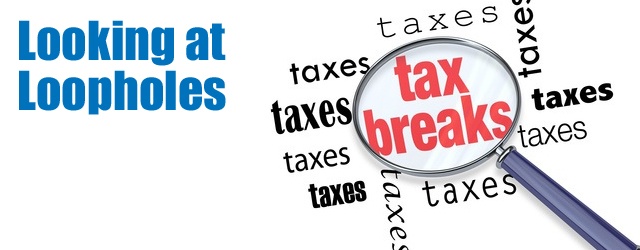Tax Chairman Wants To Trade Exemptions For Income Tax Reform
by November 28, 2011 1:00 am 354 views

House Revenue and Tax Committee Chairman Davy Carter (R-Cabot) wants to lower your personal income taxes, but he’ll have to close a number of existing loopholes to do it.
Carter, the second-term Republican who chairs the powerful panel that oversaw a bevy of targeted tax cuts in the 2011 regular session, is interested in a long-term vision for tax reform in Arkansas.
He tells Talk Business that he will hold hearings in the February 2012 fiscal session to review all existing sales tax exemptions and exclusions in an effort to find a “revenue-neutral” way to reshape individual income tax brackets for Arkansans.
“A working class family with an annual income in the low $30,000 range is in the highest marginal tax bracket in Arkansas, even though that family’s income exceeds the federal poverty level by only $10,000 or so,” Carter said. “This needs to be addressed along with other tax ‘loopholes’ and how competitive we are with our surrounding states. Essentially, I’d like to see a broader base with lower rates across the board.”
Currently, Arkansans making $32,700 or more per year are in the highest personal income tax bracket — 7%. An annual salary of $19,600 will put a state taxpayer in the second highest personal income tax bracket of 6%.
Carter thinks that because Arkansas’ economy wasn’t pounded as bad as other states in the recent recession, there is a chance to make a once-in-a-generation change in the state’s tax policy.
“For several reasons, Arkansas has been able to endure the economic downturn better than most other states in the union. As such, I think that we have a small window of opportunity to consider policy changes that could make Arkansas even more competitive nationally and generally a better place to live and work,” Carter said.
SESSION FOCUS
With the heaviest lifting in the upcoming 2012 fiscal session being focused on the Joint Budget Committee, Carter wants to use his House Revenue and Tax Committee’s time in February to study every existing sales tax exemption and exclusion on the Arkansas books.
He’s hoping there will be justifiable changes to those exemptions and exclusions that could lead to a restructuring of the personal income tax brackets for Arkansas taxpayers, but he won’t push for any changes until the regular legislative session in January 2013.
“My goal is for the legislature to take a fresh look to see whether these exemptions continue to produce these stated benefits and generally whether they still make sense,” Carter said. “To that end, I would like to see the legislature issue a ‘show cause’ notice to supporters of these exemptions and require compelling evidence for their continuance.”
Today, he’s open-minded on where the process may wind up.
“I’m going to reserve forming a final opinion until I hear all of the supporting evidence, but from what I know today, I think there are some tax exemptions that have merit and others that do not,” said Carter.
CURRENT EXEMPTIONS
There are 121 exemptions and exclusions to sales and use taxes in Arkansas, according to a list produced by the state Department of Finance and Administration (DF&A).
The categories for those exemptions cover motor fuels, the federal government, media, low-income households, medicine, agriculture, aerospace, machinery, energy, local governments, schools, and non-profits and charities.
A broad “other” category covers everything from private clubs selling alcohol to coin-operated car washes to mail-order repairs of watches and clocks to admission fees to fairs and rodeos.
“It appears to me that over the years whoever had the political clout of the day was able to carve out certain tax exemptions arguably intended to convey some broader benefit to the state as a whole,” Carter said.
“As policy makers, I think the General Assembly has an obligation to evaluate each of them and make that determination, not every session but with some regular frequency. It may very well be the case that 100% of them are warranted, but at least each of them will be properly vetted in today’s environment,” he added.
Technically, DF&A refers to the list as “Exemptions or exclusions from the 6% Arkansas gross receipts tax and compensating use tax.”
DF&A offers a disclaimer in its summary material that the list is to be used “only for classification and estimates of various exemptions and exclusions.”
Officials caution, “The estimates below should only be used as a guide to the gross receipts tax exemptions allowed under Arkansas law and not as an official estimate of any particular tax proposal. All estimates in this document are for fiscal year 2008.”
Even with that caveat, the amount of the tax exemptions and exclusions is breathtaking.
According to DF&A, the 121 tax breaks total more than $1.2 billion annually. It is likely that the working estimate of the discounts would be even greater if recalculated.
For instance, the second largest line-item exemption is $117.8 million for food and food ingredients — Gov. Mike Beebe’s (D) seminal reduction of the grocery tax. DF&A estimates are based on a reduction of 3%, but today the exemption stands at 4.5%.
The resale of gasoline and motor vehicle fuel on which the tax has already been paid accounts for the biggest dollar amount for any singular exemption at $331.79 million annually.
Also, in the 2011 regular session, 5 additional tax breaks were part of a compromise deal between Beebe and lawmakers. Those cuts, which added about $30 million in extra exemptions, are not factored into the DF&A estimate.
